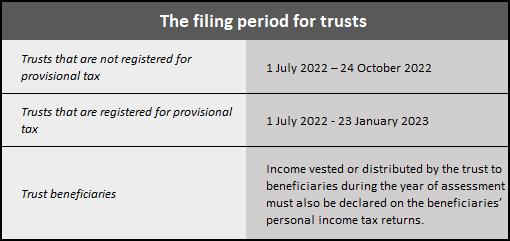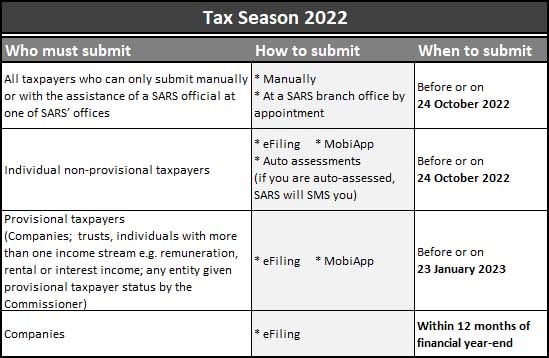
“Tax debtors are expected to take responsibility for their tax obligations and to organise their affairs in such a way as to be able to discharge those responsibilities when required. They should give at least the same priority to tax obligations as their other responsibilities.” (SARS’ Short Guide to the Tax Administration Act)
To avoid tax debt, penalties and interest, it is best to file returns and make payments timeously. However, for a range of reasons, taxpayers may not be able to meet these requirements on time, finding themselves facing a tax debt owed to SARS.
There are different ways in which tax debt can arise, and while the taxpayers’ agreement and ability to settle this debt will determine the details of each taxpayer’s response, all tax debts should be handled the same way: promptly and with professional assistance.
If you or your company have any tax debt, take action without delay! In certain circumstances and with the right professional assistance, an agreement may be reached with SARS to defer the tax debt for later payment or for payment by instalments.
How do tax debts arise?
Tax debts can arise from administrative penalties on late or non-submission of tax returns, failure to submit tax returns, the submission of returns without payment, partial payment of a tax liability or from a SARS audit assessment.
How would you know about a tax debt?
Individuals and businesses should – proactively and on a regular basis – check their compliance status with SARS or obtain a statement of account on the various taxes payable, either from their accountant or via the SARS’ Contact Centre, eFiling and the SARS MobiApp, to confirm if SARS is owed any amounts.
SARS is also required to inform taxpayers of assessments, notifications or communications issued, by also sending a message to a taxpayer’s last known number or email address. This makes it crucial to keep your contact details updated at SARS and to check your compliance status or statement of account whenever an email or SMS is received from SARS.
No dispute, but can’t pay now?
In many cases, a taxpayer may not dispute the existence or amount of a tax debt but is unable to meet the payment required by the stipulated date.
In this case, there are two options that could be considered based on the unique facts of each case.
- The first is a payment arrangement
SARS provides for a deferment, or instalment payment arrangement, for the outstanding tax debt. Taxpayers can request and enter into an instalment payment arrangement with SARS that allows the outstanding debt, including applicable interest, to be paid in one sum or in instalments over time (up to 36 months). This agreement is subject to certain qualifying criteria, for example, the payment arrangement must cover the entire debt and all non-compliance must first be remedied, which means all returns and/or recons must be correctly submitted.
Until recently, taxpayers could only make payment arrangements via a debt collector who had been appointed by SARS, in person at a SARS branch, utilising the debt management regional email addresses, or on the My Compliance Profile (MCP) on eFiling.
SARS recently implemented the Enhanced Debt Management process to help taxpayers with outstanding debt initiate a request for Payment Arrangement for Personal Income Tax (PIT); Corporate Income Tax (CIT); Value-Added Tax (VAT); Pay-As-You-Earn (PAYE) and administrative penalties via eFiling.
If granted, the repayments are loaded via eFiling to be released from the taxpayer’s bank account. Interest will continue to accrue on any unpaid debt, and any breach of the conditions will terminate the payment agreement and normal collection proceedings will resume.
- The second is a compromise agreement
Applying for a compromise agreement is an option of last resort when a taxpayer cannot afford to settle the tax debt owing to SARS. A SARS Debt Compromise is a process whereby a taxpayer requests that SARS permanently or temporarily “write-off” a large portion of their debt, with the balance being paid in full by the taxpayer immediately on the condition that the taxpayer complies with any conditions imposed by SARS.
It is important to note that a temporary write off is generally merely a suspension of the recovery of a debt, and the debt may still be recoverable during the prescription period which, under the Act, is 15 years.
In deciding to grant a compromise, a senior SARS official must have regard to several factors. However, no compromise will be granted in several instances, for example, if the taxpayer’s other tax affairs are not in order or where a taxpayer recently had a previous compromise agreement with SARS.
A compromise also cannot be considered if the taxpayer disputes the debt. If a matter is under objection or appeal, the taxpayer must withdraw the objection or appeal before a compromise can be considered.
If you are looking for a compromise with SARS, professional assistance is crucial.
Disputing a tax debt?
Often, taxpayers disagree with assessments issued by SARS. While taxpayers do have the right to dispute an assessment by lodging an objection, it is vital to note that an objection or appeal lodged with SARS does not in any way suspend or postpone the payment of the tax debt.
Aptly named the “pay-now-argue-later” principle, it applies to all tax debt.
To prevent SARS from instituting collection proceedings on a tax debt that is to be disputed, two steps are required:
- Lodge an objection in dispute of the assessment AND
- Submit a “Request for Suspension of Payment.”
The taxpayer is protected from all SARS collection procedures between the dates that SARS receives the request, to 10 business days after SARS issues its decision to grant or decline the Suspension of Payment request.
A Suspension of Payment request can only be granted by a senior SARS official, after taking into consideration several factors, including the compliance history of the taxpayer and whether the dispute is a result of fraud.
If a Suspension of Payment request is granted, SARS may not commence any collection proceedings for the tax debt in dispute pending the outcome of the objection or appeal. However, interest will accrue on the unpaid debt.
If SARS denies the Suspension of Payment request, the taxpayer also has the option to apply to SARS for a payment plan. A Suspension of Payment is also revoked if the dispute process is not followed.
On the finalisation of the objection or appeal, a revised assessment will reflect the resulting tax debt and the due date for payment. Again, if the revised tax debt is not paid on time, SARS may commence collection proceedings.
Why you must act promptly and professionally
It is a criminal offense to not submit a tax return when it is due, and it can be a criminal offense not to pay.
If you cannot pay a tax debt to SARS and do not follow the correct procedures, SARS is legally allowed to exercise its wide powers of collection. However, SARS states that when deciding the most appropriate way to deal with outstanding tax obligations, it will give considerable weight to the tax debtors’ individual circumstances and compliance history of, for example, lodging correct returns and documents and paying taxes on time.
SARS’ debt collection powers extend to issuing a judgment and having a taxpayer blacklisted; obtaining a preservation order in respect of taxpayer assets; attaching and selling taxpayer assets; and bringing sequestration or liquidation proceedings against a taxpayer, even if the debt is disputed. In fact, even the money in your savings account or your income may be in jeopardy.
This is because SARS can access data in relation to every bank account registered in your name using your ID number and can also recover tax debt through third parties who hold money on your behalf, such as a bank, an employer, an insurance company or an attorney.
Due to recent changes to the tax laws, there have been increasing reports of SARS collecting ‘outstanding tax debts’ from taxpayers’ bank accounts, without the taxpayers’ consent. While SARS can indeed do this without any judicial oversight, it is important to know that SARS is required by law to follow specific steps prescribed by the Tax Administration Act (TAA) before doing so.
These include that the taxpayer must have received an assessment from SARS detailing how much is due and by when, as well as a final demand for payment that states available debt relief mechanisms contained in the TAA; and recovery steps that SARS may take if the tax debt is not paid. Taxpayers who can prove serious financial hardship may apply to SARS for a reduction of the amount within 5 business days of receiving the final demand or extend the period over which the amount must be paid.
Only 10 business days after delivery of the final demand, if no response has been received from the taxpayer, can a senior SARS official authorise a third party to collect the tax debt. However, if SARS does not follow the steps detailed in the TAA, collection proceedings may be regarded as illegal and in contravention of the TAA, and the taxpayer will have recourse against SARS via its Complaint Management Office (CMO), the Tax Ombud or legal action. Again, in these instances, professional assistance is strongly recommended.












